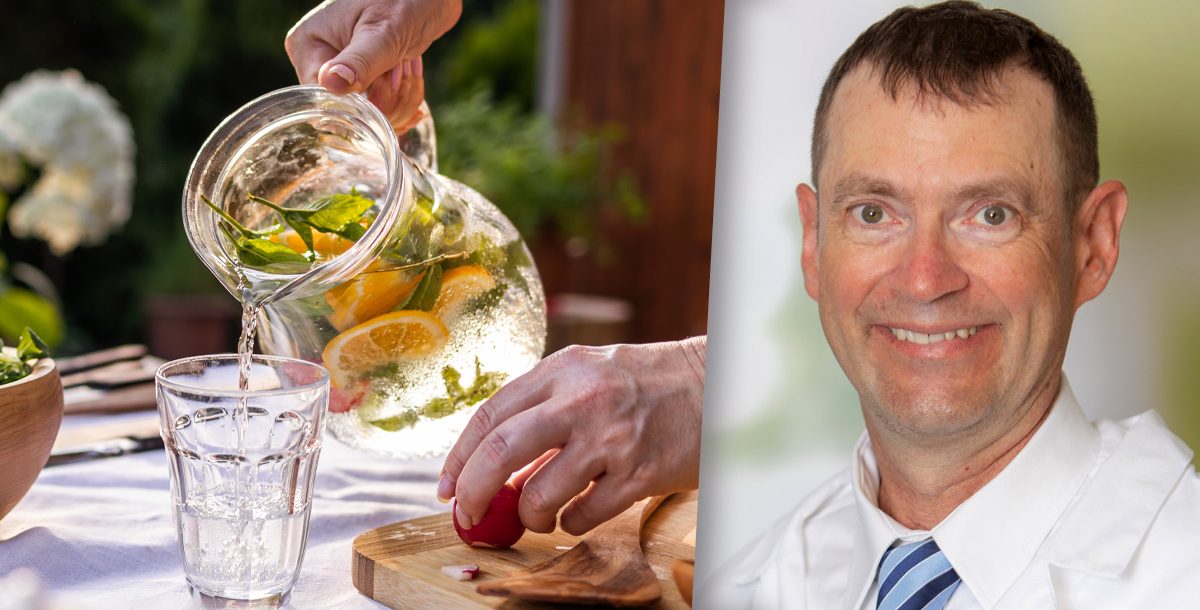Feeling thirsty? Chances are you’re already dehydrated. It can be difficult to make sure you get enough water. However, we have some hydration tips for you.
Why does your body need water?
Our bodies are made up of about 60 percent water, meaning your body depends on hydration to continue functioning properly. It’s essential to basic functions, from digestion to nutrient absorption, joint lubrication and even regulating our body temperature.
While hydration is a year-round concern, it’s especially important during the hotter summer months or during times of heavy exercise. This is because these are times when your body loses more water than normal.
If you notice any symptoms of dehydration, take a break and get some water. If you feel worse, you may need to visit your nearest urgent care or emergency department.
How much water should you drink?
In general, it is recommended that women get at least 11.5 cups (92 ounces) of fluid a day and men get 15.5 cups (124 ounces). However, this doesn’t mean you need to start carrying around a gallon-sized water jug.
“The recommended daily fluid intake doesn’t just refer to water,” Raymond Peters, MD, who practices at Mercy Health – Enon Primary Care, explains. “It takes into account total water intake, which includes foods and other beverages as well.”
What are some risks if you don’t stay hydrated?
“The biggest danger of not drinking enough water is the risk of dehydration, which can lead to headaches, fatigue, dizziness or cramping,” Dr. Peters warns. “In severe cases, the symptoms can get much worse as your body struggles to perform without the fluids it needs.”
The signs and symptoms of dehydration can vary based on age. In fact, older adults are more susceptible to dehydration as thirst often declines with age. So, if you know you or a loved one will be spending extra time in the sun this summer, plan to have extra water on hand and be careful about consuming too many poolside snacks.
“Food and drinks with a high sodium and/or sugar content are known to be contributing factors to dehydration,” Dr. Peters explains. “If you think you may be dehydrated or are on the brink of it, make sure you stay clear of fried foods and salty snacks, as well as alcoholic beverages and sugary drinks.”
How can I prevent dehydration?
It might seem overwhelming to make sure you’re getting enough water to stay hydrated. However, some simple hydration tips can help increase your water intake.
- Drink more: This sounds straightforward, but it refers to more than just plain water. Choose drinks with a high water content, such as milk and juices. Or try adding flavors or fruits to your water to enhance the taste.
- Listen to your body: Like we said, if you’re thirsty, you’re already on your way to dehydration. If your mouth is dry, you have fatigue or you feel dizzy, it’s time to get a glass of water.
- Eat hydrating foods: Many fruits and vegetables have a lot of water in them. Switch out your chips and other salty snacks for some hydrating ones instead, like watermelon, cucumbers, lettuce, tomatoes, strawberries or peaches.
- Drink even more when exercising: Your body uses more water when you exercise, and that increases when it’s hot. Aim to drink about 17 to 20 ounces of water a couple of hours before your workout, about four to eight ounces every 15 to 20 minutes during and about three cups for every pound of body weight you lost during your workout.
- Balance electrolytes: Electrolytes, such as sodium, potassium and magnesium, are important in maintaining fluid balance in the body. During intense exercise or hot weather, you may lose electrolytes through sweat. Consuming electrolyte-rich foods or drinks can help replenish these essential nutrients. Sports drinks, coconut water and electrolyte tablets are good options.
- Limit caffeine and alcohol: Both of these have diuretic effects, meaning they increase urine production and cause you to lose water quicker. Be sure to balance these with water.
- Use hydration reminders: Remembering to drink water until you’re thirsty can be a struggle, especially if you’re busy. Setting alarms, using an app, using a reusable water bottle that has reminders on it or even just always having one handy can help you drink more water throughout the day.
- Understand your body’s condition: If you’re sick, pregnant or breastfeeding, your body requires more water. When you’re pregnant or breastfeeding, your body uses more water to support your baby’s development or milk production. When you’re sick, your body is working harder to get well, or you may have symptoms such as vomiting and diarrhea that lead to greater fluid loss. Also, if you recently donated blood, you’ll need to drink extra water in order to help your body recover.
The important thing is to ensure you’re staying hydrated, and there’s one way to tell whether you’re getting enough fluids.
“The best way to determine if you are dehydrated is by judging the appearance of your urine,” Dr. Peters says. “Darker urine means you need more fluids, whereas urine that is light in color means you are hydrated.”
How we can help
With the right hydration tips, drinking enough water can prevent you from developing any symptoms of dehydration. However, if you do experience any serious signs, it’s important to get medical attention, which can include going to an urgent care or emergency department.
Learn about the primary care services we offer at Mercy Health.






